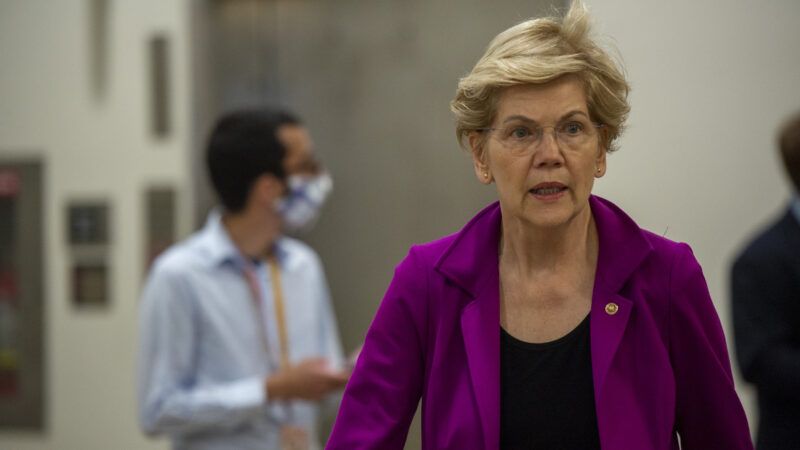Elizabeth Warren Says People Are Struggling and Jeff Bezos Hasn't Pitched In Enough
Bezos pitched in by creating an online marketplace of cheap consumer goods that people can get delivered to their homes in two days flat.

Over the weekend, the space billionaires appear to have taken up rent-free space in Sen. Elizabeth Warren's head. "The richest guy on Earth can launch himself into space while over half the country lives paycheck to paycheck, nearly 43 million are saddled with student debt, and child care costs force millions out of work," the Massachusetts Democrat tweeted Sunday. "He can afford to pitch in so everyone else gets a chance."
This is strange criticism to level at a person who has created a million jobs, has supplied cheap consumer goods to 150 million paying Prime customers (and more goods to the other 150 million who opt for slightly longer shipping times), and is attempting to put satellites in space that will enable high-speed internet access for people who live in far-flung parts of the globe. Even more confusing is the idea that Bezos' tax bill is why Americans are feeling the squeeze.
Billionaires who can afford to take a 10-minute joyride to outer space can afford to pay a #WealthTax here on Earth.
— Elizabeth Warren (@SenWarren) July 25, 2021
From the Warren vantage point, it's easy to capitalize on this moment to make the case for a wealth tax, an idea she's been fixated on for years. But taxing billionaires' fortunes will almost certainly fail. A tax on households with high net worths (over $50 million in assets, in Warren's template plan, with more for households of $1 billion or higher) would present a huge incentive for people to engage in capital flight, fleeing for greener pastures on far-away shores; taxing the same pot of money over and over will result in less money to tax over time; some assets that rich people store their wealth in are very difficult to assess; and, all these other matters aside, much of this wealth isn't actually liquid.
I suppose Warren could look to France to see how they pulled it off—except they didn't. When France implemented a wealth tax, more than 40,000 millionaires fled the country over a 12-year period. The country ultimately dropped its wealth tax; Germany and Sweden did the same to theirs.
Inequality arguments aside, Bezos should not be scapegoated for high costs of living that compel people to take on student debt and saddle them with high child care costs. Though politicians often address poverty via income-based approaches, they could take a cost-based approach instead. For example, they could try to eliminate the government-created muddled incentives that have encouraged so many colleges to jack up tuition while letting unqualified Americans take out tons of cheap loans to earn degrees that do not make them very much money. This is something that's within Warren's power to attempt to solve, not Bezos'.
Warren seems to view wealth in America as a fixed pie. But companies like Amazon that deliver cheap goods to people who want them aren't responsible for people's malaise. In fact, Bezos' creation may be easing that malaise by delivering inexpensive products to people who are otherwise struggling to get by.


Show Comments (165)